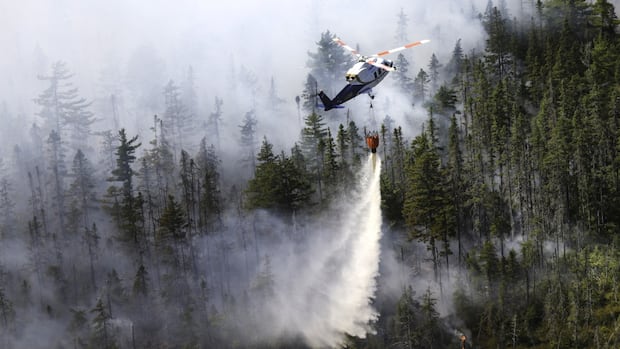As Canada is again dealing with massive wildfires, the increasing severity of the natural disasters is having the knock-on effect of spiking the demand for water bomber planes — and it will be years before Canada gets its hands on a new one.
Premiers gathered in Saskatchewan this week, one of the provinces currently gripped by wildfires. They were primarily meeting to discuss major infrastructure projects, but a number of premiers talked to reporters about dealing with the wildfire situation.
Manitoba Premier Wab Kinew, whose province has also seen thousands flee wildfires in recent weeks, mentioned that his government is waiting for an order of water bombers — but he doesn’t expect them to be delivered any time soon.
- Poor internet connection? CBC Lite is our low-bandwidth website.
“We could use every water bomber we can get our hands on. We’re going to need more water bombers in the future,” Kinew told reporters on Monday in Saskatoon.
The Manitoba government put an $80-million down payment on three new water bombers earlier this year. But they’ll only be ready by the 2031 and 2032 fire seasons.
Manitoba Premier Wab Kinew says the province has received ‘amazing’ assistance in its fight against wildfires, adding Canada will have to contend with future fire seasons being more like this, ‘which means scaling up our firefighting capability.’
“We’re in this challenge of having to respond during an emergency situation by pulling pieces that we have at our disposal,” Kinew said.
A good chunk of Canada’s water bomber fleet is made up of amphibious scoopers called the CL-415 and an older CL-215 model.
The ‘backbone’ for fighting wildfires
John Gradek, an aviation management lecturer at McGill University, calls the CL-415 the “backbone” of Canada’s firefighting fleet.
But the CL-415 hasn’t been manufactured in a decade. Bombardier sold the rights to the model in 2016. De Havilland Canada, the new manufacturer, began building a factory near Calgary in 2022 to produce a newer model.
The company told CBC News that production at that plant has begun but it has several orders in line, including from international buyers.
“To date, we have had 22 orders from EU member states and are in discussions with a number of Canadian and European customers to grow their fleets. We are now in production and are ramping up to meet current and future demand,” the company said in an emailed statement.
Ontario Premier Doug Ford said his province is also in line for new planes.
“Ontario has about 11 bombers. We ordered another six more water bombers … the problem is right now they’re backlogged,” he said on Sunday.
“They produce them in Alberta, God bless them. But it’s taking four years to produce more water bombers.”
It appears as though the Europeans beat Canada to the punch. Orders from Europe were in place as early as 2022. Canadian governments only started placing orders in the wake of the 2023 wildfire season — the worst the country has seen on record.
Gradek said the European customers will likely get their planes within the next few years, but Canada will have to wait.
“The demand for these airplanes has skyrocketed in the last four or five years as a result of climate change,” he said.
As Canada continues to see severe wildfires, at least one province is bringing previously grounded planes back into its fleet. Newfoundland and Labrador announced this spring that it would be repairing a CL-415 that had been out of service since 2018.
Gradek said he expects to see other provinces follow that example, saying that some are already “cannibalizing” older CL-214 models for parts.
“They’re borrowing and stealing parts on the grounded airplanes to keep their regular fleet afloat,” he said.
Ford said Sunday that the ongoing fires are emphasizing the need for Canada to have a national wildfire strategy.
“We do need that national strategy to make sure that when issues like this happen, we have the resources, we have the water bombers,” Ford said.
“We need a total fleet right across our great country.”
Gradek agreed that it’s well past time for Canada to have a nationalized water bomber fleet.
“We’ve reached the point now where climate change is going to be further aggravating whatever scenario we have,” he said.





